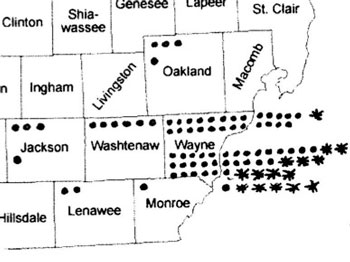In the Archives: The Friendless Dead
Willie Brown ended his days among strangers, his body submerged with theirs in a large vat of preservative liquid in the basement of the onetime University of Michigan medical school that stood on the east side of the present-day Diag.

Origin points for each of the over 100 cadavers donated to the UM in 1881. (Map compiled by the writer from Anatomical Donations Program records. Image links to complete map.)
The 22-year-old had never married or had children. If he kept a diary it apparently was not preserved in a public archive. His parents were from New York state, but even this meager detail was forgotten by the author of his death certificate. Willie was a hired farmhand, without distinctions like membership in the Pioneer Society of Washtenaw County. That group counted as a member his employer, successful veteran Pittsfield farmer Jefferson Rouse.
Ignored in life, Willie commanded intense attention after death from the medical students dissecting his body. They examined and took notes on the body that had helped shear Rouse’s 350 sheep, tend his dozen pigs, and harvest the hops, potatoes, apples, wheat, and Indian corn on Rouse’s 560 acres between Saline and the present-day Ann Arbor airport.
The students may have dissected Brown’s lungs to look for signs of the tuberculosis that killed him. When Willie got sick, he apparently wasn’t cared for on the farm, at least not for long. He went to the county poorhouse, at what is now the southwest corner of Washtenaw Avenue and Platt Road. There among the other nearly 70 residents in 1881, he died.
No friend or relative claimed him, and he wasn’t buried in the unmarked poorhouse cemetery just west of the poorhouse. His body was placed on a wagon that traveled from the poorhouse up the dirt road of Washtenaw Avenue to the medical school. Medical science owed Willie’s contribution to a new 1881 state law that strengthened the up-till-then largely-ignored proviso that the bodies of the unfortunate could be legally delivered to the UM for study. [Full Story]



